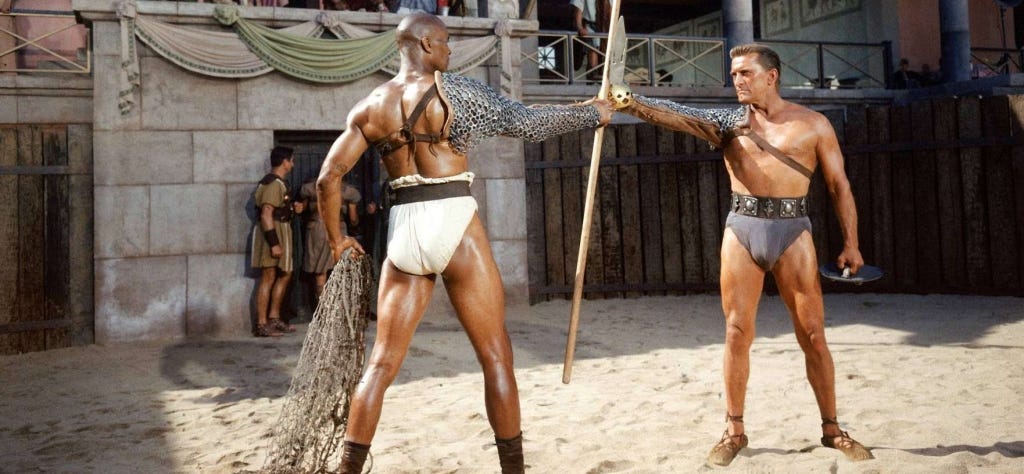This is the opening section of Chapter 25, One True Spartacus from Everything You Believe Is Wrong.
Defiance
At the end of the eponymous movie, the slave army led by gladiator-cum-general Spartacus (Kirk Douglas) lies defeated before the creator of the First Triumvirate, General Marcus Licinius Crassus (Laurence Olivier). But Crassus does not know which of the multitude is his foe. He offers to commute the enemy army's sentence of crucifixion on the condition the survivors identify the body or person of Spartacus. One after the other the men rise, defiantly shouting, “I am Spartacus!"
Crassus, who knows his logic, realizes that because each man claimed to be the one true Spartacus, there could be no one true Spartacus, and so he released them all in the names of Diversity, Tolerance, and Equality.
Kidding! I'm kidding.
Crassus did not succeed in discovering with certainty which prisoner was Spartacus. He reasoned that because the slave war existed and was led by a man named Spartacus, there had to be one true Spartacus. He wanted to punish the one true Spartacus. So he crucified everyone. Brutal, but effective.
Based on subtle behavioral clues, he most suspected two of the men were the one true Spartacus. He saved this pair for last and had them fight to the death. The still-undiscovered one true Spartacus mercifully killed his lieutenant, but was then himself crucified. Crassus never knew for sure he had his man---and to add to the subtlety, the one true Spartacus never shouted I am Spartacus! Still, Crasus reasoned that, given the evidence he had, he made the best choice.
Which he did. Make the best choice. If Crassus reasoned as we first supposed, by that odd logical rule which stated that because every man claimed to be the one true Spartacus there could therefore not be a one true Spartacus, he would have committed the One True Spartacus Fallacy. This fallacy says because there is a choice or there is disagreement over the truth of a proposition, there can be no one right answer.
Many gods
Stated so simply, the fallacy is absurd, and you might figure nobody would ever wield such a limp noodle. You would be wrong. The One True Spartacus Fallacy is particularly beloved of atheists who use it to deny that all other religions except theirs is false, which is a sort of two-for-one solecism. The routine in argument has become standard. First comes the One True Spartacus, then comes the denial that their religion is a religion, the latter error likely arising from the false belief that religions must have nameable, immortal gods.
Regardless whether I'm right about atheists having a religion, it is certain the One True Spartacus for the atheist plays the same role as the Peer Review Fallacy does for scidolators; see Chapter [Science]. This can be seen via some atheists' favorite joke. This lists minor deities in whom they disbelieve, and in whom they assume Christians disbelieve. Then comes the quip that they, the atheists, "reject" only one more deity than the traditional theist. Funny. As a plain statement of observation, it is nothing more than a sophomorism, but if it is used, as it almost always is used, to imply that the one more deity---God---does not therefore exist, or that He should not be believed in, it is the One True Spartacus Fallacy.
A Good Joke
Two theists of different religions and an atheist walk into a bar. Theist One says, "My religion is the one true religion." Theist Two says, "No, my religion is the one true religion." The atheist says, "What loons you two are. All religions claim to the one true religion. Therefore there is no one true religion." Given just the information available, the atheist has committed the One True Spartacus Fallacy and at least one of the theists has made an error, and possibly both have, though we cannot know on this evidence alone.
Theists fall into error, too. Usually this is because of humility coupled with justified uncertainty, which are no bad things, or perhaps because of a too liberal interpretation of ecumenicism or mercy, which are not such good things (the interpretations). The polite theist resists claiming his religion is the one true religion, even though he believes it is, in an effort to spare the feelings of his audience, perhaps hoping to win his listeners over by coyness. The danger is that this practice becomes habitual and the theist forgets what he believed. And then he looks around and sees all the other religions and then says to himself his cannot be the one true one.
Buy my new book and learn to argue against the regime: Everything You Believe Is Wrong.
Visit me at wmbriggs.com.




